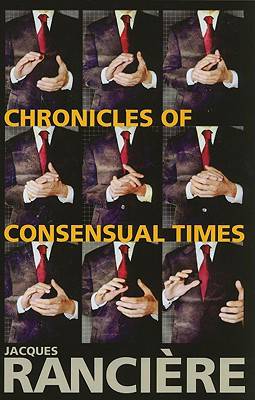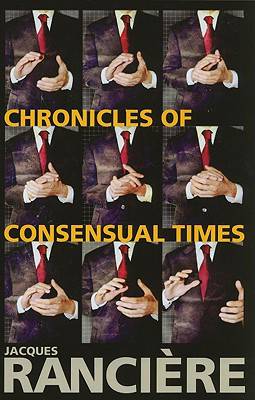
Je cadeautjes zeker op tijd in huis hebben voor de feestdagen? Kom langs in onze winkels en vind het perfecte geschenk!
- Afhalen na 1 uur in een winkel met voorraad
- Gratis thuislevering in België vanaf € 30
- Ruim aanbod met 7 miljoen producten
Je cadeautjes zeker op tijd in huis hebben voor de feestdagen? Kom langs in onze winkels en vind het perfecte geschenk!
- Afhalen na 1 uur in een winkel met voorraad
- Gratis thuislevering in België vanaf € 30
- Ruim aanbod met 7 miljoen producten
Zoeken
Omschrijving
In this fascinating collection, Jacques Ranciere, one of the world's most important and influential living philosophers, explores the nature of consensus in contemporary politics.
Consensus does not mean peace. Instead it refers to a map of operations of war, of a topography of the visible, of what is possible and what can be thought, in which war and peace live side-by-side. Lying at the heart of these consensual times are new forms of racism and ethnic cleansing, humanitarian wars and wars against terror. Consensus also implies using time in a way that sees in it a thousand devious turns. This is evident in the incessant diagnoses of the present and of amnesiac politics, in the farewells to the past, the commemorations, and the calls to remember.
But all these twists and turns tend toward the same goal: to show that there is only one reality to which we are obliged to consent. What stands in the way of this undertaking is politics. These chronicles aim to re-open that space wherein politics once more becomes thinkable.
Consensus does not mean peace. Instead it refers to a map of operations of war, of a topography of the visible, of what is possible and what can be thought, in which war and peace live side-by-side. Lying at the heart of these consensual times are new forms of racism and ethnic cleansing, humanitarian wars and wars against terror. Consensus also implies using time in a way that sees in it a thousand devious turns. This is evident in the incessant diagnoses of the present and of amnesiac politics, in the farewells to the past, the commemorations, and the calls to remember.
But all these twists and turns tend toward the same goal: to show that there is only one reality to which we are obliged to consent. What stands in the way of this undertaking is politics. These chronicles aim to re-open that space wherein politics once more becomes thinkable.
Specificaties
Betrokkenen
- Auteur(s):
- Uitgeverij:
Inhoud
- Aantal bladzijden:
- 168
- Taal:
- Engels
Eigenschappen
- Productcode (EAN):
- 9780826442888
- Verschijningsdatum:
- 22/08/2010
- Uitvoering:
- Hardcover
- Formaat:
- Ongenaaid / garenloos gebonden
- Afmetingen:
- 136 mm x 206 mm
- Gewicht:
- 290 g

Alleen bij Standaard Boekhandel
+ 206 punten op je klantenkaart van Standaard Boekhandel
Beoordelingen
We publiceren alleen reviews die voldoen aan de voorwaarden voor reviews. Bekijk onze voorwaarden voor reviews.









